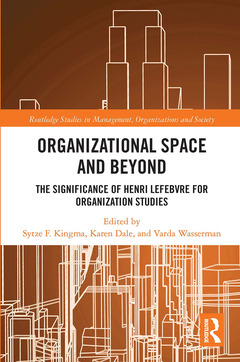Description
Organisational Space and Beyond
The Significance of Henri Lefebvre for Organisation Studies
Routledge Studies in Management, Organizations and Society Series
Coordinators: Dale Karen, Kingma Sytze F., Wasserman Varda
Language: English
Subjects for Organisational Space and Beyond:
Keywords
Lefebvre’s Spatial Triad; Spatial Triad; Henri Lefebvre; Lefebvre’s Work; Organizational Studies; Organizational Space; Abstract Space; Strategic Logic; Lefebvre’s Writings; organisational life; Lefebvre’s Approach; Sytze F; Kingma; Absent Spaces; Varda Wasserman; Linear Rhythms; Timon Beyes; Organization Studies; Fabio James Petani; Vice Versa; Jeanne Mengis; Lefebvre’s Theory; Perttu Salovaara; Spatial Practises; Arja Ropo; Workplace Canteens; Gili S; Drori; Spatial Heuristics; Briana Preminger; Lefebvre’s Triad; Sarah Warnes; Tea Stations; Louise Nash; Open Plan Office; Tuomo Peltonen; Prayer Area; Harriet Shortt; St Michael’s Cathedral; Zhongyuan Zhang; Archaeological Park; Inbal Ofer; Novi Beograd; Daniel S; Lacerda; Young Men; Plural Leadership; Lefebvre’s Triadic Concept
Publication date: 12-2020
· 15.2x22.9 cm · Paperback
Publication date: 06-2018
· 15.2x22.9 cm · Hardback
Description
/li>Contents
/li>Readership
/li>Biography
/li>
Through the focus on organizational space, using the reception and significance of the seminal work on the subject by sociologist Henri Lefebvre, this book demonstrates why and how Lefebvre's work can be used to inform and elaborate organisational studies, especially in view of the current interest in the "socio-material" dimension of organisations.
As the "spatial turn" in organisational research exposed the importance of spatial design in inducing power and cultural relations, Lefebvre's perspective has become an inspiring, theoretical framework. However, Organisational Space and Beyond explores how Lefebvre?s work could be of a much wider relevance, especially given his profound theoretical engagement with diverse schools of philosophical and sociological thought, including Nietzsche, Marx, Sartre and Foucault.
This book brings together a range of authors that collectively develop a broader understanding of Lefebvre's relevance to organizational studies, including areas of management concern such as strategy and diversity studies, and ultimately draw on Lefebvre?s work to rethink, reimagine and reshape scholarship in organisational studies. It will be of relevance to researchers, academics, students and organizational professionals in the fields of organisation studies, management studies, cultural studies, architecture and sociology.
1. Introduction: The Significance of Henri Lefebvre for Organizational Studies
Part 1: Lefebvrian Perspectives
2. Lefebvre as a Young Marxist: Rethinking the Triad in the Study of Organizational Space
3. Making Space, Making Time: Organizations and Social Scaling
4. Understanding Power Dynamics and Surveillance through Lefebvre's Conceptualisation of Space
5. Everyday’s Yesterday: Space and the Quotidian in the Vintage Marketplace
Part 2: Everyday Practices
6. Humour as Moments: Lefebvre’s Social Space and Humour
7. The Embodied Working Space of an English Cathedral
8. The Strategic Logic of Space: Using Lefebvre’s Rhythmanalysis to Understand Organisation Strategies
9. The Topography of Masculinity
10. Cake, Social Relations and the Open-plan Office
Part 3: The Politics of Space
11. Facing the Camp: Lefebvre, Refugee Settlements and the Politics of Organization
12. Producing the Space of Democracy: Spatial Practices and Representations of Urban Space in Spain's Transition to Democracy
13. The Production of Urban Space in the Age of Mass Consumerism: Revisiting Lefebvre and Spatialised Ideology
14. The Role of Institutional Actors in Constructing Space
15. The Organizational Process through which we Produce, Consume and Dispose of Space over Time
Karen Dale is a Senior Lecturer and Director of Teaching in the Department of Organization, Work and Technology at Lancaster University, UK.
Sytze Kingma is a Senior Lecturer in the Department of Organization Sciences at Vrije Universiteit Amsterdam, Netherlands.
Varda Wasserman is a Senior Lecturer in the Department of Management and Economics at the Open University of Israel, Israel.

